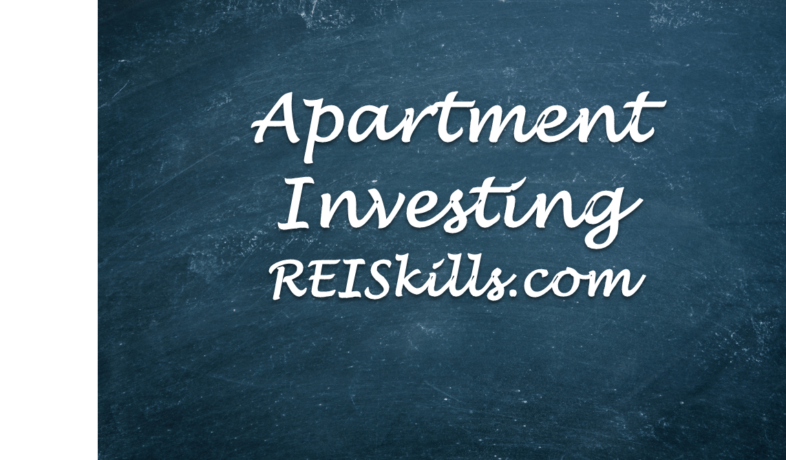When evaluating the operational strength of our properties, one of the key metrics I look at is NOI (Net Operating Income). A common misconception is that you have to maintain a very high occupancy to maximize your profit. While other multifamily property owners and operators look at occupancy levels as a barometer of how successful the property is performing, I prefer to focus on NOI. One of the key reasons is that occupancy levels can appear high, but they don’t necessarily reflect whether lower rent or other concessions were made in order to retain tenants – concessions that could adversely affect the property’s net income.
So, what is NOI? It’s calculated by taking the property’s total income and subtracting all operating expenses. The only exception on expenses is that NOI doesn’t include capital expenditures, which are one-time expenses such as roof repairs and HVAC replacement. NOI provides a key insight into the health of a property and also measures just how well costs are being managed.
As an example, a 100-unit property rents out at $1,000 per month. That means the property’s gross monthly income is $100,000. If the monthly expenses are calculated at $25,000, which includes staff salaries, utilities, maintenance including landscaping, painting, etc., the net operating income is $75,000.
Boosting Net Operating Income by Increasing Income
Our business model is to purchase Class B properties and perform value-add improvements in order to increase rents. This also helps to boost the NOI. Our goal of increasing NOI can be achieved in two ways. First, it can be done by increasing income, with higher rents, adding fees, and adding new services. Examples of new services include adding reserved parking spaces, installing in-unit washers and dryers, or offering valet trash service.
The other way to increase NOI is to decrease expenses. This can be achieved by reducing turnover costs when tenants move, reducing monthly expenses for recurring services, or by fighting property tax assessments.
The mistake many property owners make is to focus on pushing occupancy levels instead of focusing on boosting their NOI. The reasons for boosting occupancy include improving the property’s bottom line, and also improving the property’s reputation within the market, which could ultimately make leasing easier.
Here’s an example: If you own a property with 100 units renting at $1,000 per month, and you’re 100% occupied, your gross monthly income is $100,000. However, if only 95% of the units are occupied, the income drops to $95,000. However, in reality things can get more complicated.
If a property is 100% occupied, it generally means that rents are under market. Using the previous example, market rents could be $1,200. As fewer people can afford $1,200 per month compared to $1,000 per month rent, occupancy may drop to 95%. Income, however, increased to $114,000 vs. $100,000 at 100% occupancy with $1,000 monthly rents. That’s why the focus should be on boosting the NOI, not the occupancy.
Also, it doesn’t make financial sense to advertise if there are no units available. Most experts agree that 95% occupancy indicates a successful property, and the goal should be to have an equal balance between physical occupancy and rents in order to maximize your NOI. It is delicate balance, because while you want to reduce expenses as much as possible, you still want to be sure that the property is maintained in good condition. The key is to keep tenants happy in order to minimize turnover, so income doesn’t decrease.
Boosting Net Operating Income by Reducing Expenses
Reducing operating expenses is crucial in order to boost the NOI, because the lower the expenses, the higher the NOI. That’s why it pays to take advantage of every possible opportunity to lower expenses.
Having a strategy in place to reduce expenses is the best way to increase your NOI. Rather than budgeting for maintenance and repairs, it would be better to implement a preventative maintenance program for the property. By doing this you’re not only finding new ways to reduce operating expenses, you’re also helping to prolong the life of the property. This is especially important when it comes to expensive major mechanical systems.
Another strategy used by property owners and operators is to bring the repair and maintenance services in-house. The more services you can bring in-house, the more you can eliminate outside services that are costly to utilize. Most properties have personnel available to perform some of the tasks, like pressure washing, leaf blowing, and simple electrical or plumbing repairs.
Utilizing technology-based services is another tactic used to reduce expenses. Transitioning tenants to use web-based property management can help reduce personnel costs. Tenants go online to request repairs or maintenance service. It’s all tracked by software which minimizes wait times and helps monitor repairs that should be billed to the tenant as a result of damage or other problems.
Reviewing service contracts is an excellent way to reduce expenses and ensure that you’re being charged competitive rates. This applies to landscaping services, pool maintenance, painters, plumbers, and many other trades. Get several bids from area contractors and compare what you’re currently paying versus what a new vendor might charge. Many times, the difference in costs can be significant, and the savings will go directly to your bottom line.
Installing the latest energy-efficient appliances and technology will help cut your utility bills. If you have a 10-year-old refrigerator as compared to a current Energy Star one, your savings can be as much as $160 per year, per unit. That can add up to significant savings. If the property owner is the one paying for utility bills, installing a Nest digital thermostat will help reduce annual heating and cooling costs. Adding some of the latest water-saving features in units can help to significantly reduce water utility bills. Installing the latest tamper-proof shower regulators to eliminate the older 4-gallon per minute shower heads will save a substantial amount of money, as will the latest faucets in bathrooms and kitchens.
Speaking of water bills, leaks are the biggest cause of higher water costs, as one statistic shows that 1 in 5 toilets leak at any given time. That leak can waste up to 250 gallons of water every day, which adds up to 108,000 gallons per year. That could add up to a staggering $24,000 per year for a 100-unit property. Monitoring for leaks can all be done wirelessly using various tools on the market that lets landlords find and monitor leaking toilets.
One other strategy to consider is appealing tax bills, which are the biggest expense properties face. Many property owners are using companies that handle the appeal process either on a percentage basis or by charging a fixed fee. The company doing the appeal generally receive 20% to 30% of the amount saved, which could be a significant amount of money.
Summary
While many property owners use occupancy levels as a metric of how successfully a property is performing, I use Net Operating Income (NOI) as a measure of success. I do this because NOI offers an accurate assessment into the health of a property and also measures just how well costs are being managed.
When a property is 100% occupied, it generally means that the rents are too low. This impacts the NOI, and it makes sense to focus on boosting the NOI instead of the occupancy. It also helps to reduce expenses, as this will also help to boost the NOI. Additionally, when a property is 100% occupied, it doesn’t make sense to pay to advertise as units aren’t available.
One of the best ways to lower expenses is to develop a strategy. This can include everything from bringing repair and maintenance in-house, to reviewing outside vendor contracts, and getting competitive bids to installing energy-efficient appliances and water-saving devices that will also help reduce utility bills. In many cases these actions will save a significant amount of money. There are also companies you can hire to appeal property tax bills. Having the ongoing expense reduction strategy in place will help to boost NOI over the long term, which is where the focus needs to be.
Want to Invest with Ellie Perlman?
If you are interested in learning more about passively investing in apartment buildings, click here to schedule a call with Ellie.
About the Author
Ellie is the founder of Blue Lake Capital, a commercial real estate investment firm specialized in multifamily investing throughout the United States. At Blue Lake Capital, Ellie partners with both institutional and individual investors to grow their wealth by achieving double-digit returns by investing alongside her in exclusive multifamily deals they usually don’t have access to.
A defining factor of Blue Lake Capital’s strategy is founded in utilizing machine learning/artificial intelligence throughout the course of all acquisitions and asset management. This advanced technology enables the company to produce accurate and data-driven forecasting for all assets on a market, property, and even tenant basis. In doing so, Blue Lake is able to lead commercial investments with the full capabilities of today’s technology.
Ellie is the host of REady2Scale , a podcast that highlights honest, insightful, and thought-provoking discussions on the multiple approaches for successful real estate investing.
She started her career as a commercial real estate lawyer, leading real estate transactions for one of Israel’s leading development companies. Later, as a property manager for Israel’s largest energy company, she oversaw properties worth over $100MM. Additionally, Ellie is an experienced entrepreneur who helped build and scale companies by improving their business operations.
Ellie holds a Masters in Law from Bar-Ilan University in Israel and an MBA from MIT Sloan School of Management.
You can read more about Blue Lake Capital at www.bluelake-capital.com and learn more about Ellie at www.ellieperlman.com.


